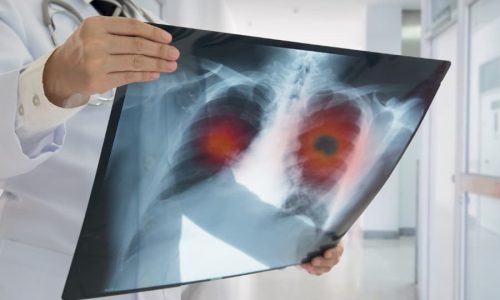
How Does Physical Therapy Help After a Mastectomy?
Physical therapy is well known for its role in helping patients recover from sports injuries, surgeries, and orthopedic conditions. Many people may not realize that
HIPAA Alert: Potential Data Breach Learn More
Questions on Oncology, Hematology and/or Infusion Clinical Services due to COVID-19 Crisis – CALL 833-698-1623
Important Information for Our Patients Regarding the Coronavirus.
RCCA Providing Area Cancer Patients with Access to Care During Coronavirus Outbreak
RCCA Offering Patients Virtual Visits During Coronavirus Pandemic
Lung cancer is the second most common type of cancer affecting men and women in the United States, excluding skin cancers. It also causes more deaths than any other type of cancer, so prompt detection of lung cancer is key to initiating treatment in the early stages of the disease, when physicians have the best opportunity to achieve good outcomes. Regional Cancer Care Associates (RCCA) is a provider of world-class medical care for patients with cancer and blood disorders in New Jersey, Connecticut, Massachusetts, and the Washington, D.C., area. Here, RCCA shares information about how common lung cancer is and the importance of early detection.

Lung cancer occurs when abnormal cells grow out of control in the lungs, eventually forming a cancerous growth, or tumor. There are two main types of lung cancer:
Lung cancer symptoms vary, but often include a persistent cough, chest pain, shortness of breath, and fatigue. The main cause of lung cancer is smoking tobacco, with most people with lung cancer smoking at the time of their diagnosis or having smoked previously. According to the American Cancer Society, more than 84 percent of women and 90 percent of men with a new diagnosis of lung cancer either smoke or used to smoke. However, patients who have never smoked or been around secondhand smoke can still get lung cancer.
Lung cancer is the second most common type of cancer, not including skin cancer, for men and women in the U.S. It is the cause of the most cancer-related deaths in the U.S., accounting for around 20 percent of all cancer deaths. Every year, more patients die from lung cancer than colon, breast, and prostate cancers combined.
The American Cancer Society estimates that there will be 234,580 new cases of lung cancer and 125,070 deaths from lung cancer in 2024. Worldwide, around 2,206,771 people were diagnosed with lung cancer (both NSCLC and SCLC) in 2020.
Lung cancer usually develops in older people, mostly in those aged 65 or older. The average age of diagnosis is around 70. In general, the chance that a man will develop lung cancer in his lifetime is about one in 16; for a woman, it is about one in 17. Although lung cancer is a very serious disease, the good news is that there has been an overall decrease in the number of new lung cancer cases and lung cancer deaths in the United States in recent years. This is largely because more and more people are quitting smoking or never starting, although advances in cancer treatment also have helped reduce the death rate.
Lung cancer survival rates vary depending on several factors, including the type and stage of the cancer and the patient’s age and overall health. The five-year relative survival rate for all types of lung cancer in the U.S. is 23 percent, but that percentage differs considerably among lung cancer subtypes.
Non-small cell lung cancer is the most common type of lung cancer and is also the less- aggressive type. The five-year survival rate for NSCLC is 28 percent for both genders, 33 percent for American women, and 23 percent for American men. If the cancer has not spread outside the lung, the five-year relative survival rate is 65 percent.
However, most patients with NSCLC are diagnosed after the cancer has metastasized (spread outside the lung). If the lung cancer has only spread to nearby lymph nodes, the five-year relative survival rate is about 37 percent. If it has metastasized to distant body parts, the five-year relative survival rate drops to around 9 percent.
Small cell lung cancer is the more-aggressive type of lung cancer, so the survival rates are lower than they are for NSCLC. The overall five-year relative survival rate for people in the U.S. with SCLC is 7 percent, which breaks down as 8 percent for women, and 6 percent for men. If the cancer is localized to the lung, the overall five-year survival rate is 30 percent, but around 94 percent of SCLC patients are diagnosed once the cancer is no longer localized.
If the lung cancer has only spread to nearby lymph nodes, the five-year relative survival rate is about 18 percent. If it has spread to other body parts, the five-year relative survival rate is around 3 percent.
Patients should keep in mind that these survival rates are merely estimates and cannot predict how long any specific patient will live. However, they are useful to know as patients consider their treatment options. Patients should discuss their specific prognosis with their medical team.
One reason lung cancer has the highest cancer-related mortality rate of any cancer is that most patients are diagnosed in the advanced stages of the disease, when treatment options can be more limited. Lung cancer symptoms often do not appear until the cancer has already advanced, and some patients may attribute them to another health problem, which can further delay diagnosis.
Lung cancer is more likely to be treated successfully if it is found and treated early in the disease course, which is why early detection and screening are important. Screening is only recommended for high-risk individuals or people who fit certain criteria. These include people who:
The screening test used for lung cancer is low-dose computed tomography (also known as a low-dose CT scan or LDCT). An LDCT scan is obtained from an X-ray machine that uses low-dose radiation to take detailed images of the lungs to find abnormal areas. Getting a yearly LDCT scan can help detect cancer early and lead to better prognoses in high-risk individuals.
While being diagnosed with lung cancer can be very daunting, patients should remember that there are treatment options available that can help them live longer and more comfortably. The recommended lung cancer treatment will vary depending on the cancer’s type and stage, but may consist of one or more of the following:
These therapies can be combined and given at the same time or sequentially. For patients with advanced cases of lung cancer, integrative care and palliative care can help with managing side effects and stress.
Lung cancer prevention is important. The main way to prevent lung cancer is to not smoke or chew tobacco products – or by quitting if you do use those products. Counseling, medications, and other smoking-cessation resources are available to help. Other prevention measures include reducing exposure to substances that increase a person’s risk of developing lung cancer, including:
People should strive to be in smoke- and pollution-free environments whenever possible to reduce their chances of lung cancer. Losing weight (if a person is overweight), eating a healthy diet, exercising, and reducing stress may not be linked definitively to preventing lung cancer, but also can help people remain healthy and have a strong immune system.
People at high risk for lung cancer should talk to their medical providers about lung cancer screening. Those who have already been diagnosed can trust their cancer treatment to Regional Cancer Care Associates. RCCA provides world-class medical care close to home, with 20-plus care centers throughout New Jersey, Connecticut, Massachusetts, and the Washington, D.C., area. To learn more about lung cancer treatment at RCCA, request an appointment today.
For more information or to schedule an appointment,
call 844-346-7222. You can also schedule an appointment by calling the RCCA location nearest you.

Physical therapy is well known for its role in helping patients recover from sports injuries, surgeries, and orthopedic conditions. Many people may not realize that

Colon cancer is often treated with surgery, which can have a long recovery period. When patients understand what to expect, they feel more confident about

Routine screening is an individual’s first line of defense against colon cancer. Many people have the freedom to choose which type of screening to undergo,

Regional Cancer Care Associates is one of fewer than 200 medical practices in the country selected to participate in the Oncology Care Model (OCM); a recent Medicare initiative aimed at improving care coordination and access to and quality of care for Medicare beneficiaries undergoing chemotherapy treatment.